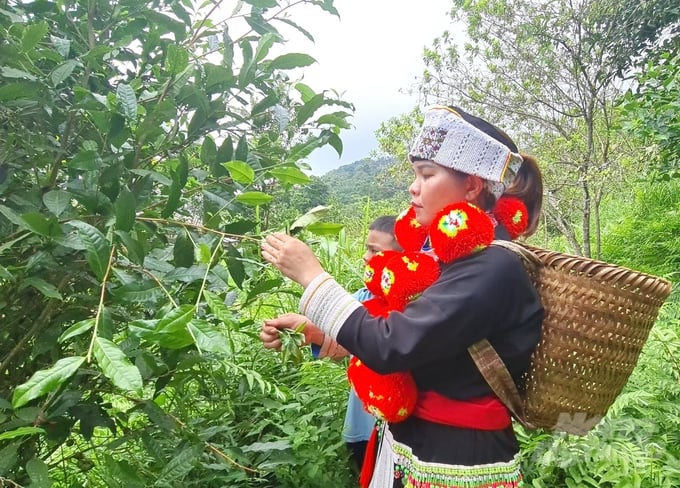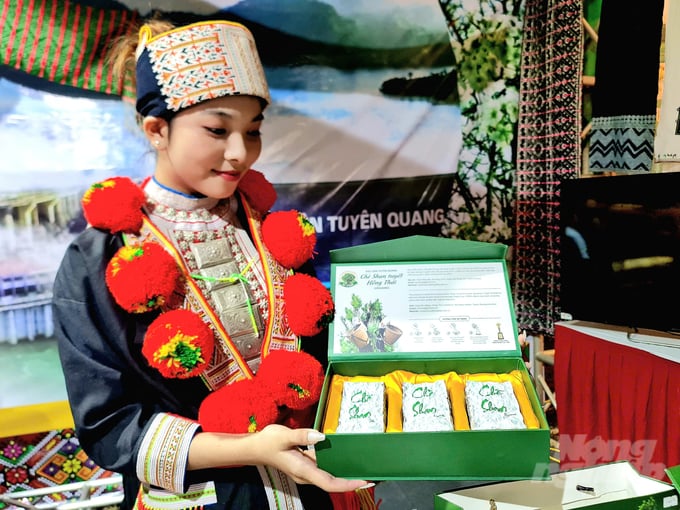May 19, 2025 | 18:56 GMT +7
May 19, 2025 | 18:56 GMT +7
Hotline: 0913.378.918
May 19, 2025 | 18:56 GMT +7
Hotline: 0913.378.918

The movement toward sustainable agriculture among cooperatives has expanded high-value agricultural production areas in Tuyen Quang Province. Photo: Dao Thanh.
Binh Minh Organic Agricultural Cooperative, located in Tu Quan Commune, Yen Son District, Tuyen Quang Province, was established in 2020. Its primary goal is to develop the production and trade of products derived from medicinal plants and organic fruit trees such as male papaya, guava, Morinda officinalis (Indian mulberry), Celastrus hindsii, Solanum procumbens, Ardisia silvestris, sapodilla, among many others.
To date, the cooperative has developed a 4-hectare production area certified under the Vietnamese organic agricultural standards. Certified crops in this area include male papaya, Celastrus hindsii, Solanum procumbens, and pear guava.
After four years of dedication to sustainable agriculture, the cooperative has received a 3-star OCOP certification for four products, including male papaya flower honey infusion, guava tea, Solanum procumbens-Celastrus hindsii tea, and ginseng tea with male papaya flowers and Celastrus hindsii. Notably, in mid-October, the cooperative successfully exported its male papaya flower honey infusion and guava tea to the United Kingdom.
Do Thanh Kim, Deputy Director of the Binh Minh Organic Agricultural Cooperative, shared that the degradation of agricultural land and declining soil fertility were persistent concerns for local farmers like him. This issue prompted the cooperative to adopt sustainable agriculture as a core development direction. Accordingly, the cooperative members meticulously implemented each production stage, which ranges from soil preparation and fertilization to seed selection and the use of plant protection products.
Similar to Binh Minh Cooperative, the sustainable agriculture movement has gained strong momentum among other agricultural and forestry cooperatives in Tuyen Quang Province. As a result, these cooperatives have developed large-scale production areas for oranges, pomelos, tea, and peanuts following sustainable farming practices while prioritizing environmental protection. As a result, the products from these efforts meet both OCOP standards and food safety requirements. Additionally, they are popular among consumers across different markets, commanding high value.
Notable examples include the 10-hectare organic pomelo farm belonging to Quang Mung Organic Fruit and Vegetable Cooperative in Binh Xa Commune, Ham Yen District; the 21-hectare organic Shan Tuyet tea farm belonging to Son Tra Cooperative in Hong Thai Commune, Na Hang District; and the 50-hectare VietGAP and organic-certified tea farm belonging to Su Anh Tea Cooperative in My Lam Ward, Tuyen Quang City.

Various agricultural products from cooperatives in Tuyen Quang province have established strong brand identities and a firm foothold in the market with sustainable farming practices. Photo: Dao Thanh.
Nguyen Thi Huyen, General Director of Quang Mung Organic Fruit and Vegetable Cooperative in Binh Xa Commune, Ham Yen District, shared that organic pomelo production benefits both the soil and human health. Moreover, the fruit achieves higher quality, an attractive appearance, and a rich, sweet flavor. During the harvest season, supermarkets and commercial centers in major cities purchase the entirety of the cooperative's yield at a stable price of 18,000 to 20,000 VND per fruit.
The cooperative's pomelo farm achieved its organic certification in 2020. Subsequently, it received an official production unit code in 2023. This milestone has paved the way for Quang Mung's pomelos to enter larger, more demanding markets, such as Europe, which offer high economic value.
At present, Tuyen Quang Province is home to 602 cooperatives with 12,759 members and a total registered capital of over 2.3 trillion VND. Among this group, 458 cooperatives are engaged in agriculture and forestry, and 144 operate in non-agricultural sectors.
Le Hai Nam, General Director of the Tuyen Quang Province's Sub-Department of Rural Development, noted that cooperatives engaged in organic and VietGAP agriculture are reinforcing their position on the market. They recognize that organic production is a necessary development trend to enhance the value and brand of Tuyen Quang's agricultural products. This development trend also introduces new opportunities, allowing cooperatives to increase incomes and improve livelihoods through the achievements of responsible and sustainable agriculture.
Tuyen Quang Province currently houses over 48,700 hectares of forest area certified for sustainable forest management under international (FSC) and national (VFCS/PEFC) standards. Among this area, over 16,400 hectares fall under the management of organizations, and 32,300 hectares under the management of household groups.
Outside of its benefits and positive impacts, FSC certification presents significant challenges. For example, family forest owners possess limited knowledge regarding sustainable forest management. Additionally, the low issuance rate for land use rights certification poses difficulties in the formation of groups to develop sustainable forest management plans.
Translated by Nguyen Hai Long

(VAN) 14 out of 35 domesticated elephants in Dak Lak province have had their living conditions improved, with 11 of them currently participating in the non-riding elephant tourism model.

(VAN) Muong Nhe Nature Reserve hopes that being upgraded to a national park will lay the foundation for forest protection efforts to be carried out in a systematic, modern, and sustainable manner.
/2025/05/16/3923-2-171845_52.jpg)
(VAN) Lower costs, higher yields, and improved soil quality are outstanding benefits that soybeans bring when integrated into the crop rotation system.

(VAN) The 'For a Green National Environment' programme aims to promote a green lifestyle, support businesses in implementing ESG practices, and turn Net Zero commitments into concrete actions.

(VAN) Cold-barn systems efficiently manage environmental and temperature conditions, which aids in the prevention of respiratory diseases in pigs and protects them from the vectors that transmit African swine fevers.

(VAN) To tackle challenges, the project 'Addressing key technical bottlenecks in the grouper supply chain in Vietnam' has been underway since 2024.

(VAN) The project 'Disease-Resilient and Sustainable Cassava Production Systems in the Mekong Region', funded by the Australian Center for International Agricultural Research (ACIAR), is being implemented from 2024 to 2028.